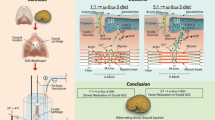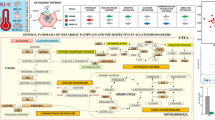Abstract
Fluctuations in the thermal environment may elicit different responses in animals: migration to climatically different areas, regulation of body temperature, modification of biochemical reaction rates, or assuming a state of dormancy. Many ectothermic reptiles are active over a range of body temperatures that vary seasonally. Here we test the hypothesis that metabolic enzyme activity acclimatises seasonally in freshwater turtles (Chelodina longicollis) in addition to, or instead of, behavioural regulation of body temperatures. We measured body temperatures in free-ranging turtles (n=3) by radiotelemetry, and we assayed phosphofructokinase (PFK), lactate dehydrogenase (LDH), citrate synthase (CS) and cytochrome c oxidase (CCO) activities in early autumn (March, n=10 turtles), late autumn (May, n=7) and mid-winter (July, n=7) over a range of assay temperatures (10 °C, 15 °C, 20 °C, 25 °C). Body temperatures were either not different from, or higher than expected from a theoretical null-distribution of a randomly moving animal. Field body temperatures at any season were lower, however, than expected from animals that maximised their sun exposure. Turtles maintained constant PFK, LDH and CCO activities in different months, despite body temperature differences of nearly 13.0 °C between March (average daily body temperature=24.4 °C) and July (average=11.4 °C). CS activity did not vary between March and May (average daily body temperature=20.2 °C), but it decreased in July. Thus C. longicollis use a combination of behavioural thermoregulation and biochemical acclimatisation in response to seasonally changing thermal conditions. Ectothermic reptiles were often thought not to acclimatise biochemically, and our results show that behavioural attainment of a preferred body temperature is not mandatory for activity or physiological performance in turtles.




Similar content being viewed by others

Abbreviations
- CS :
-
citrate synthase
- CCO :
-
cytochrome c oxidase
- LDH :
-
lactate dehydrogenase
- PFK :
-
phosphofructokinase
References
Angilletta MJ, Niewiarowski PH, Navas CA (2002) The evolution of thermal physiology in ectotherms. J Therm Biol 27:249–268
Bakken GS, Gates DM (1975) Heat transfer analysis of animals: some implications for field ecology, physiology, and evolution. In: Gates DM, Schmerl RB (eds) Perspectives of biophysical ecology. Springer, Berlin Heidelberg New York, pp 255–290
Bennett AF, Dawson WR (1976) Metabolism. In: Gans C, Dawson WR (eds) Biology of the Reptilia, vol 5. Academic Press, New York, pp 127–223
Case T (1976) Seasonal aspects of thermoregulatory behavior in the Chuckawalla, Sauromalus obesus (Reptilia, Lacertilia, Iguanidae). J Herpetol 10:85–95
Christian K, Tracy CR, Porter WP (1983) Seasonal shifts in body temperature and use of microhabitats by Galapagos land iguanas (Conolophus pallidus). Ecology 64:463–468
Christian KA, Bedford GS, Schultz TJ (1999) Energetic consequences of metabolic depression in tropical and temperate-zone lizards. Aust J Zool 47:133-141
Crawford DL, Powers DA (1989) Molecular basis of evolutionary adaptation at the lactate dehydrogenase-B locus in the fish Fundulus heteroclitus. Proc Natl Acad Sci USA 86:9365–9369
Crawford DL, Pierce VA, Segal JA (1999) Evolutionary physiology of closely related taxa: analyses of enzyme expression. Am Zool 39:389–400
DiBona GF (2003) Thermoregulation. Am J Physiol 284:R277–R279
Grigg GC, Seebacher F, Beard LA, Morris D (1998) Thermal relations of very large crocodiles, Crocodylus porosus, free-ranging in a naturalistic situation. Proc Roy Soc Lond B 265:1793–1799
Guderley H, Johnston IA (1996) Plasticity of fish muscle mitochondria with thermal acclimation. J Exp Biol 199:1311–1317
Guderley H, Leroy PH (2001) Family of origin and the response of threespine stickleback, Gasterosteus aculeatus, to thermal acclimation. J Comp Physiol 171:91–101
Guderley H, St. Pierre J (2002) Going with the flow or life in the fast lane: contrasting mitochondrial responses to thermal change. J Exp Biol 205:2237–2249
Hardewig I, van Dijk PLM, Moyes CD, Pörtner HO (1999) Temperature-dependent expression of cytochrome-c oxidase in Antarctic and temperate fish. Am J Physiol 277:R508–R516
Hazel JR (1995) Thermal adaptation in biological membranes: is homeoviscous adaptation the explanation? Annu Rev Physiol 57:19–42
Huey RB (1982) Temperature, physiology, and the ecology of reptiles. In: Gans C, Pough FH (eds) Biology of the Reptilia, vol 12. Academic Press, New York, pp 25–91
Huey RB, Berrigan D, Gilchrist GW, Herron JC (1999) Testing the adaptive significance of acclimation: a strong inference approach. Am Zool 39:323–338
Johnston IA, Temple GK (2002) Thermal plasticity of skeletal muscle phenotype in ectothermic vertebrates and its significance for locomotory behaviour. J Exp Biol 205:2305–2322
Kingsolver JG, Huey RB (1998) Evolutionary analyses of morphological and physiological plasticity in thermally variable environments. Am Zool 38:545–560
Lin J-J, Somero GN (1995) Thermal adaptation of cytoplasmic malate dehydrogenases of eastern pacific barracuda (Sphyraena spp): the role of differential isoenzyme expression. J Exp Biol 198:551–560
Manning B, Grigg GC (1997) Basking is not of thermoregulatory significance in the “basking” freshwater turtle, Emydura signata. Copeia 1997:579–585
Nelson T, McEachron D, Freedman W, Yang W-P (2003) Cold acclimation increases gene transcription of two calcium transport molecules, calcium transporting ATPase and parvalbumin beta, in Carassius auratus lateral musculature. J Therm Biol 28:227–234
Olson JM (1987) The effects of seasonal acclimatization on metabolic-enzyme activities in the heart and pectoral muscle of painted turtles Chrysemys picta marginata. Physiol Zool 60:149–158
Olson JM, Crawford KM (1989) The effect of seasonal acclimatization on the buffering capacity and lactate dehydrogenase activity in the freshwater turtle Chrysemys picta marginata. J Exp Biol 145:471–476
Seebacher F (1999) Behavioural postures and the rate of body temperature change in wild freshwater crocodiles, Crocodylus johnstoni. Physiol Biochem Zool 72:57–63
Seebacher F (2000) Heat transfer in a microvascular network: the effect of heart rate on heating and cooling in reptiles (Pogona barbata and Varanus varius). J Theor Biol 203:97–109
Seebacher F (2001) A new method to calculate allometric length-mass relationships of dinosaurs. J Vertebr Paleontol 21:51–60
Seebacher F, Grigg GC (1997) Patterns of body temperature in wild freshwater crocodiles, Crocodylus johnstoni: thermoregulation versus thermoconformity, seasonal acclimatisation, and the effect of social interactions. Copeia 1997:549–557
Seebacher F, Grigg GC (2001) Changes in heart rate are important for thermoregulation in the varanid lizard, Varanus varius. J Comp Physiol B 171:395–400
Seebacher F, Grigg GC, Beard LA (1999) Crocodiles as dinosaurs: behavioural thermoregulation in very large ectotherms leads to high and stable body temperatures. J Exp Biol 202:77–86
Seebacher F, Guderley H, Elsey RM, Trosclair III PL (2003a) Seasonal acclimatisation of muscle metabolic enzymes in a reptile (Alligator mississippiensis). J Exp Biol 206:1193–1200
Seebacher F, Elsey RM, Trosclair III PL (2003b) Body temperature null-distributions in reptiles with nonzero heat capacity: seasonal thermoregulation in the American alligator (Alligator mississippiensis). Physiol Biochem Zool 76:348–359
Sharpe M, Love C, Marshall C (2001) Lactate dehydrogenase from Antarctic eelpout, Lycodichthys dearborni. Polar Biol 24:258–269
St. Pierre J, Boutilier RG (2001) Aerobic capacity of frog skeletal muscle during hibernation. Physiol Biochem Zool 74:390–397
Tracy CR (1982) Biophysical modelling in reptilian physiology and ecology. In: Gans C, Pough FH (eds) Biology of the Reptilia, vol 12. New York, Academic Press, pp 275–321
Van Damme R, Bauwens D, Verheyen RF (1987) Thermoregulatory responses to environmental seasonality by the lizard Lacerta vivipara Herpetologica 43:405–415
Voet D, Voet JG (1995) Biochemistry. Wiley, New York
Wilson RS, Franklin CE (2002) Testing the beneficial acclimation hypothesis. Trends Ecol Evol 17:66–70
Woods HA, Harrison JF (2002) Interpreting rejections of the beneficial acclimation hypothesis: when is physiological plasticity adaptive? Evolution 56:1863–1866
Acknowledgements
This study was funded by a University of Sydney Sesqui Research and Development Grant to FS and MBT, and a grant from the Peter Rankin Trust Fund for Herpetology to JS. All procedures had the approval of the University of Sydney Animal Ethics Committee and the NSW National Parks and Wildlife Service. We would like to thank D. Ayrton, P. Harvey, J. Herbert, C. Holleley, J. Llewelyn, J. MacDonald, J. Sommer, and S. Williams for help with field work.
Author information
Authors and Affiliations
Corresponding author
Additional information
Communicated by I.D. Hume
Rights and permissions
About this article
Cite this article
Seebacher, F., Sparrow, J. & Thompson, M.B. Turtles (Chelodina longicollis) regulate muscle metabolic enzyme activity in response to seasonal variation in body temperature. J Comp Physiol B 174, 205–210 (2004). https://doi.org/10.1007/s00360-003-0331-2
Accepted:
Published:
Issue Date:
DOI: https://doi.org/10.1007/s00360-003-0331-2



